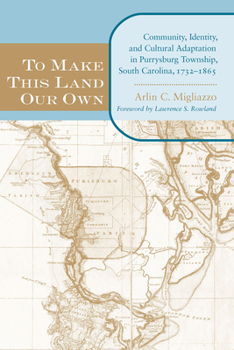To Make This Land Our Own: Community Identity and Social Adaptation in Purrysburg Township, South Carolina, 1732-1865
(Part of the Carolina Lowcountry and the Atlantic World Series)
A case study in the social history of frontier town building set in the swamps of South Carolina
On the banks of the lower Savannah River, the military objectives of South Carolina officials, the ambitions of Swiss entrepreneur Jean Pierre Purry, and the dreams of Protestants from Switzerland, France, Germany, Italy, and England converged in a planned settlement named Purrysburg. This examination of the first South Carolina township in Governor Robert Johnson's strategic plan to populate and defend the colonial backcountry offers the clearest picture to date of the settlement of the colony's Southern frontier by ethnically diverse and contractually obligated immigrants.
Arlin C. Migliazzo contends that the story of Purrysburg Township, founded in 1732 and set in the forbidding environment bounded by the Savannah River and the Coosawhatchie swamps, challenges the notion that white colonists shed their ethnic distinctions to become a monolithic culture. He views Purrysburg as a laboratory in which to observe ethnic phenomena in the colonial and antebellum South. Separated by linguistic, religious, and cultural barriers, the ?migr?s adapted familiar social processes from their homelands to create a workable sense of community and identity. His work is one of only a handful of examples of what has been deemed the "new social history" methodology as applied to a South Carolina subject.
Initially devastated by privation and a high mortality rate, Purrysburg residents also suffered the vicissitudes of an indifferent provincial elite, the encroachment of lowcountry rice planters, Prevost's invasion in 1779, and ultimate destruction of the settlement by Sherman's army. Migliazzo details the community's changing military and economic fortunes, the gradual displacement of its residents to neighboring communities, the role of African Americans in the region, the complex religious life of township settlers, and the quirky contributions of Purry's climatological speculations to the fateful siting of this first township.
Related Subjects
History




